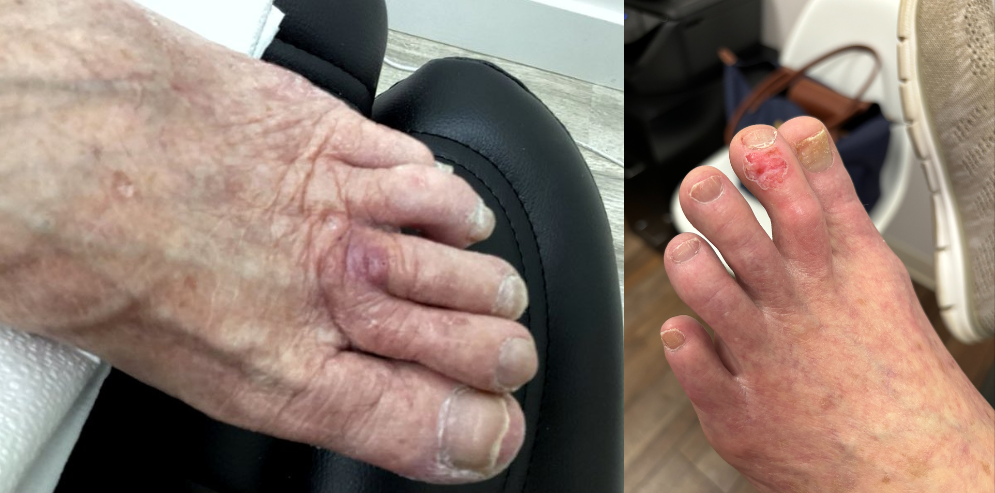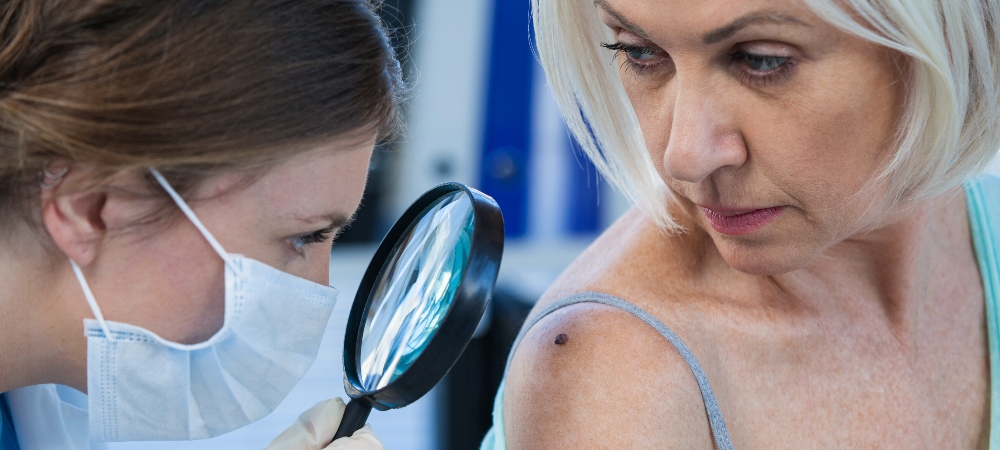
Melanoma—the most dangerous kind of skin cancer—usually looks like a mole, not a rash. However, skin cancer can appear as a rash if you’re dealing with a common type of skin cancer. Although neither basal cell skin cancer nor squamous cell skin cancer will appear as a rash 100% of the time, either type of skin cancer may start out as a red, scaly patch of skin that could be mistaken for dermatitis, eczema, or psoriasis. Skin rash may also be a sign of other types of cancer. It’s important to learn the differences between rashes and cancer. GentleCure is here to help you compare both.
Skin Cancer vs. Rash: Know the Signs
A red, scaly patch on your skin may be a standard rash, eczema, psoriasis, or a sign of common skin cancer—but what does a skin cancer “rash” look like? Can you develop a rash from cancer? When you’re trying to decide if something is a rash or cancer, here are a few things that you’ll want to keep in mind:
- Any unusual skin changes should be discussed with your dermatologist at the earliest opportunity.
- Skin cancer is usually localized to a specific area, whereas rashes and other skin conditions can spread over a wide portion of the body.
- Certain types of skin conditions and rashes can produce flakes or shedding of skin, whereas skin cancers are usually more firm.
- Basal cell skin cancer may start as a patch of skin that looks like a rash. Over time, it may expand, forming an indentation at the center which might begin to ooze or bleed.
- Skin cancer will usually, though not always, appear on the parts of the body that receive the most sun exposure. Skin rashes can appear on the face, but many others will appear on the arms, legs, or torso. Psoriasis commonly appears on the “folds” of the body, like the elbows and knees. Eczema can appear on the hands, neck, elbows, and feet, or around the eyes.
- Most rashes will go away on their own, or with the help of over-the-counter medications like hydrocortisone. Skin cancer will not go away on its own, and that means that it’s important to consider duration when comparing skin cancer vs. rashes.
Early detection is an important determiner of outcomes wherever cancer is concerned, and it’s always better to err on the side of caution. Keep a close eye on changes to your skin, and know when to schedule a professional screening.
Rash from Cancer: Is Rash a Sign of Cancer?
Can cancer cause skin rashes? Skin cancers and skin rashes are separate phenomena that may resemble one another, but a skin rash can be caused by cancer that’s hidden from your view. Where other types of cancer are considered, skin rashes can be a clear—and directly connected—symptom. Below, you’ll find some of the less common versions of cancer that can cause skin rashes, or rash-like symptoms:
- Leukemia: The loss of platelets in the body by this blood cancer can lead to broken blood vessels under the skin that resemble a rash.
- Mycosis fungoides: One of the earliest signs of mycosis fungoides is the skin will develop rash-like patches that eventually become sores and tumors as the white blood cells attack the skin.
- Sézary syndrome: Classified as a leukemia version of mycosis fungoides, this type of cancer can cause an itchy, red rash to develop over the majority of the body — up to 80%.
- Kaposi sarcoma: A type of cancer that develops in the lining of blood vessels and the lympthatic system, it can cause lesions on the skin’s surface that are deep red, purple, or brown.
It’s important to speak to your doctor if you’re concerned that a skin rash could be caused by cancer or an easily treated skin condition.
For Common Skin Cancer, Consider GentleCure™
Many types of common skin cancer can be treated with Image-Guided Superficial Radiotherapy (Image-Guided SRT), which carries no risk of surgical scarring. If your apparent rash turns out to be basal cell skin cancer or squamous cell skin cancer, talk to your doctor to find out if GentleCure™ is right for you. For a more informed conversation, contact us online to speak with our skin cancer information specialists.








